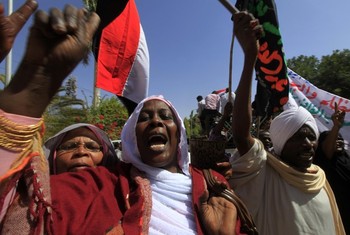Sudan urges African Union to press Juba over Abyei’s administration
June 5, 2013 (KHARTOUM) – Sudan reiterated the need to establish local institutions in the disputed area of Abyei, and urged the African Union to press Juba on this issue.

During a recent meeting held in Khartoum, Al-Falim insisted on the need to form Abyei Police Service (APS), the administration and the legislative council particularly after the increase of tensions between the Dinka Ngok and the Misseriya as result of the killing of the Ngok paramount chief Kuol Deng Kuol earlier last May.
Delegations from the two countries met for the last time on 22-24 May but failed to make any progress on Abyei institutions. Regarding the police, the AJOC had to meet on 6 June to discuss the issue but the meeting was adjourned sine die.
The Ngok refuse the implementation of an agreement reached on 20 June 2011 to establish an interim administration in Abyei unless Khartoum accepts to hold a referendum proposed by the African Union mediation next October. Sudanese government rejects this process because it excludes the Misseriya pastoralists from participating in the vote.
South Sudanese minister of cabinet affairs Deng Alor Kuol, who is also a dignitary of the contested area, told the parliament in Juba on 28 May that without a referendum the Dinka Ngok refuses to form the interim administration and other bodies.
The establishment of the joint administration is also hindered by the difference of the two sides over their representation at the Abyei Legislative Council. Khartoum refusal to allocate 60% (12) of the seats of the llegislative body to South Sudan as it was the case during the interim period and demands 50% (10) of the 20 seats.
South Sudan following the death of Abyei paramount chief showed some frustration with the position of the African Union which mediates the conflict. President Salva Kiir on 12 June said the regional body failed to impose its own recommendations in Abyei, in a reference to the referendum proposal.
The Small Arms Survey, in a recent update released on 3 July, said that the United Nations Interim Security Force for Abyei (UNISFA) is on high alert and carry out around 90 patrol per day, pointing out it would be difficult to maintain such intensity during the rainy season.
Khartoum, on the other hand, speaks about activities of Sudanese rebel groups in Abyei and says they cross from South Sudan to Abyei before to enter in South Kordofan.
Following an attack a pipeline near Ajaja station, 62 km east of Diffra oil fields, the Sudanese army was keen to say that the area of the attack is under the protection of UNISFA peacekeepers and accused Justice and Equality Movement of the attack. It added that the rebels crossed from Unity state, implying the involvement of South Sudan in the attack.
The rebel group denied the responsibility of the attack and Juba said there is no Sudanese rebels in Unity state. However, the attack adds another factor of insecurity and tension in the disputed area.
(ST)
